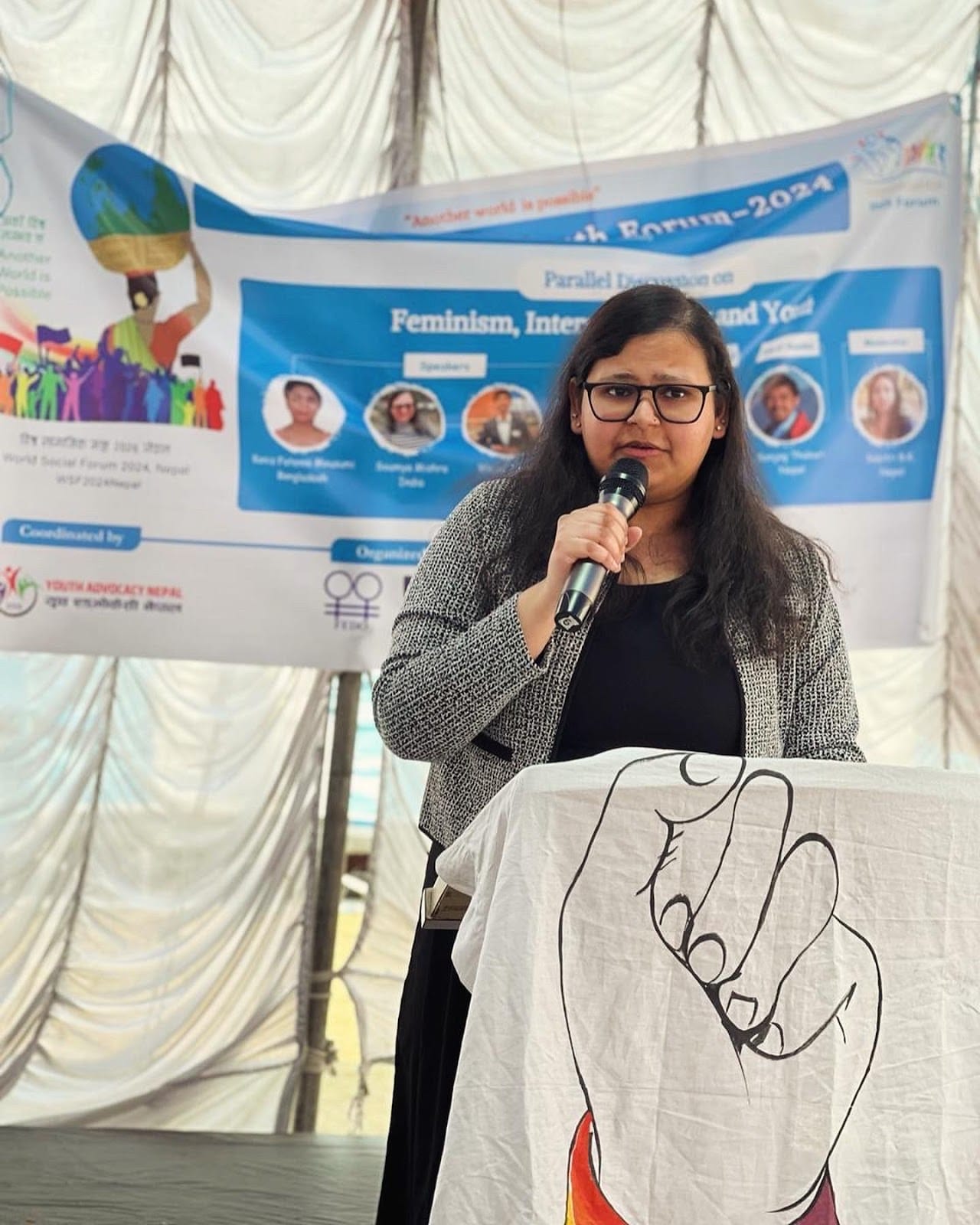I had the privilege of participating in the 16th conference of the World Social Forum in Kathmandu, Nepal from February 15th to 19th, 2024. The WSF serves as an important annual gathering where civil society organisations convene to deliberate on and present alternative solutions to address the numerous inequalities exacerbated by neoliberal globalisation in our world. More than 50,000 participants representing over 1,400 organisations from 98 countries attended the 16th edition of WSF.

As a young, queer-disabled feminist, such spaces serve as important platforms to exchange ideas, find solidarity and build networks of care because otherwise the politics of design, which makes spaces inaccessible and unaccommodating, is inherently built on systems that exclude disabled minds and bodies. As a result of which, we are constantly left behind, or rather pushed behind, left unseen, unheard and invisibilised.
There is a popular slogan in the social justice space, “nothing about us, without us,” but the truth is, “nothing without us,” because everything affects us. Carrying similar sentiments, during the inaugural day, the participants, including fellow activists, peers, and leaders from the nonprofit sector converged in Kathmandu for a powerful Solidarity March. Together, we marched in unity, chanting the empowering mantra: "Another world is possible."
(Image Courtesy: Oxfam in Asia)
On the second day of the World Social Forum, there was an insightful dialogue focused on addressing inequality. This session offered an inclusive platform for grassroots movements, women's rights organisations, youth groups, and various stakeholders to candidly discuss their experiences of struggle, the tangible impacts of escalating inequality in their everyday lives, and their unwavering commitment to collaborative action. One of the key themes that emerged from the discussion was that the fight for justice is essentially challenging the patriarchal and capitalist system. The fundamental issue behind our current crises lies in the unequal accumulation of power and privilege. Thus, achieving economic, social, and environmental justice is inseparable from achieving gender justice.
(Image Courtesy: Oxfam in Asia)
The dialogues at the Forum also foregrounded how diverse young people’s lives are across the world. We are not a monolith and have different needs and visions that stem from our lived experiences. During Day 3, I called attention to this when I had the honour of delivering a speech at the Intercontinental Youth Forum, proudly representing India as a young advocate for queer rights and disability inclusion, with a feminist perspective. I underlined that inclusion does not mean getting people together in a room, but creating a space where co-creation can take place, which also entails decentralisation of power.
Here are the key highlights from my speech:
🌻 It is imperative that we foster cross-movement solidarities that include and uplift disabled individuals within our social justice endeavours.
🌻 Emphasising power sharing and community care is essential in our collective struggle against inequalities.
🌻 Accountability is a reciprocal process. We must empower young voices to question rather than silence them.
Cultivating and nurturing feminist leadership involves a lot of listening and sharing of power, where we can question and co-develop solutions together. As Audre Lorde says, “we do not live single-issue lives.” So we can not achieve collective liberation in siloes because none of us are free until all of us are free.
As we moved to Day 4, the Forum had enlightening panels such as "Enhancing Equity in Climate Finance," which delved deeply into the shortcomings of our existing economic system in serving both people and the planet. The dialogue highlighted how humanity grapples with a complex crisis of climate change and inequality. The world's wealthiest individuals, nations, and corporations exacerbate this by emitting carbon and amassing wealth. The top 1% alone contribute significantly to emissions, disproportionately affecting the majority. Despite the Paris Agreement, promised funding for climate action, especially in vulnerable regions, often falls short, leaving marginalised communities to suffer the consequences of climate extremes. We delved into potential avenues for transformative change aimed at securing a sustainable planet and quality life for all.
(Image Courtesy: Oxfam in Asia)
We were also treated to uplifting discussions centred around “Reimagining a Care-Centred Economy.” This engaging dialogue spotlighted the importance of restructuring our economic framework to prioritise care, drawing from the rich insights of feminist ideologies and movements.
(Image Courtesy: Oxfam in Asia)
On the fifth and concluding day, participants collaborated to craft the Civil Society Statement advocating for a world founded on principles of justice and equity. During the closing ceremony, all attendees were extended the opportunity to sign the banner in solidarity with this cause.
(Image Courtesy: Asia Centre)
Since its establishment in 2001, the World Social Forum (WSF) has served as a guiding light for social movements, unions, and activists worldwide, providing a space for them to convene, exchange insights, and forge strategies for societal transformation. It stands out as a distinct platform where solutions to myriad pressing global challenges are openly discussed. The convening highlighted the importance of building bridges across various social justice movements to keep the fight sustainable and our hopes for a better world alive.
I deeply resonated with the fact that the Forum underscored the importance and relevance of community building as we push back against various systemic issues and inequalities. As a young, queer-disabled feminist, who is also leading Community Building at EquiLead, I firmly believe in the vision that as humans we need care and solidarity, and a community to lean on, more so when we come from various vulnerable backgrounds. In a highly individualised world, where power remains centralised, thus exacerbating exclusion, we need to intentionally build allyship to disrupt the status quo, and advance gender equity and inclusion.
Hence, at EquiLead, our focus is on realising a transformative vision through prioritising community building as a strategic method, to establish and foster communities for women leaders from various backgrounds, empowering them to join, evolve, and assume leadership roles in organisations dedicated to creating a positive societal change.




